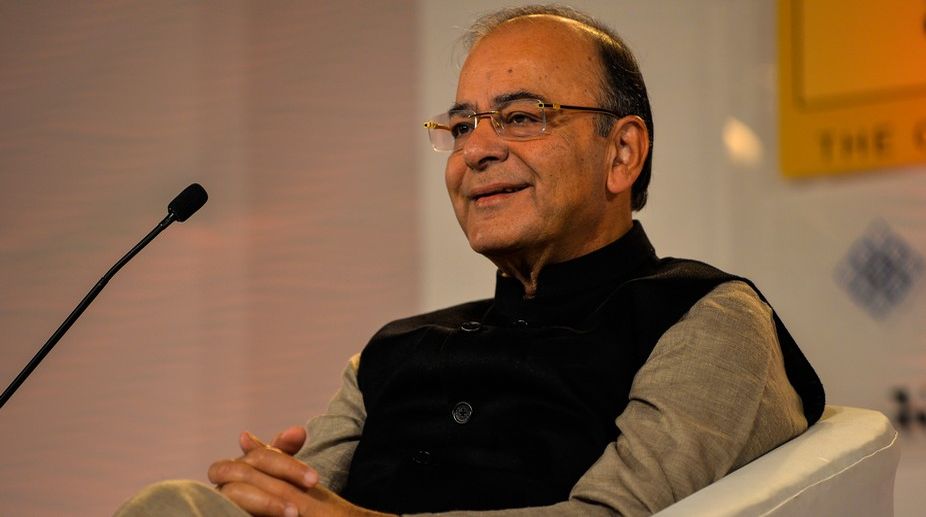Listing out the benefits of demonetisation, Union Finance Minister Arun Jaitley on Friday said that direct tax collections had risen 15.7 per cent till September 18, adding that undisclosed income of Rs 5,400 crore was also detected.
“Net collections up to September 18 in the current financial year rose to Rs 3.7 lakh crore, a growth of 15.7 per cent. The revenue collections in case of direct taxes rose to Rs 8,49,818 crore during 2016-17, a growth of 14.5 per cent,” he said while highlighting the impact of November 8 demonetisation and the proactive initiatives of the Income Tax Department.
Advertisement
Jaitley was addressing the Consultative Committee of the Finance Ministry ‘Initiatives of the Income Tax Department’ here.
The Minister said the number of taxpayers increased significantly from 4.72 crore in 2012-13 to 6.26 crore during 2016-17.
“As far as the drive against black money is concerned, the department has taken various initiatives since this government came to power. After the intense follow-up of demonetisation data from November 9, 2016, to January 10, 2017, about 1,100 searches were made, resulting in the seizure of Rs 610 crore, including Rs 513 crore in cash.
Undisclosed income of Rs 5,400 crore was detected and about 400 cases referred to the Enforcement Directorate and the Central Bureau of Investigation (CBI) for appropriate action,” he said.
In this regard, the Minister mentioned the enactment of the Black Money Act, 2015, comprehensive amendments to the Benami Act of 1988 and ‘Operation Clean Money’.
Jaitley said the department has taken various initiatives in the last 2-3 years to bring about efficiency, transparency, and fairness in tax administration.
The Minister said a Single Page ITR-1 (SAHAJ) Form was introduced for taxpayers with annual income up to Rs 50 lakh.
“The rate of tax for individuals with income of Rs 2.5 lakh to Rs 5 lakh was reduced from 10 per cent to 5 per cent, one of the lowest in the world,” he added.
Jaitley said the concept of ‘no scrutiny’ was introduced for the first time non-business taxpayers with incomes of up to Rs 5 lakh so that more and more people were encouraged to come under the tax net and file their I-T returns.
He said corporate tax was reduced to 25 per cent for companies with turnover of up to Rs 50 crore, thereby covering almost 96 per cent of the companies.
The new manufacturing companies incorporated on or after March 1, 2016, were given an option to be taxed at 25 per cent without deduction. The Minimum Alternate Tax (MAT) credit was allowed to be carried forward up to 15 years, instead of 10 years, as part of procedural reforms.
In the field of e-governance, the Finance Minister said that 97 per cent of the income tax returns were filed electronically this year, of which 92 per cent were processed within 60 days and 90 per cent refunds issued within 60 days.
“Grievance redressal system — e-nivaran — was introduced, which integrates all online and paper grievances and tracks them till their resolution. Every grievance is acknowledged and resolution intimated through emails and SMSes. Eighty-four per cent of 4.65 lakh e-nivaran grievances have been resolved so far,” he said.
Jaitley said that the e-governance initiatives of the Income Tax Department have helped in having minimum direct interface between tax assessing authorities and assesses, which in turn helped in minimising harassment, curbing corruption, and saving time.
He highlighted other department initatives as far as ease of doing business and promoting financial markets were concerned. He specifically mentioned the introduction of presumptive taxation scheme for professionals with incomes of up to Rs 50 lakh.
The Minister said India had entered into collaboration with 148 countries on exchange of information on tax matters and with 39 countries on criminal matters.
He said changes in the Double Taxation Avoidance Agreements with Mauritius and Singapore have been incorporated to allow for source-based taxation of capital gains on shares and interest income of banks.
In order to promote less-cash economy and digital transactions, the Minister said, various initiatives were taken, including penalty for cash receipt of Rs 2 lakh or more, reducing limit for cash donation to charitable trusts from Rs 10,000 to Rs 2,000 and to Rs 2,000 to political parties.
The Consultative Committee members gave suggestions to improve both revenue collections and overall performance of the department.











